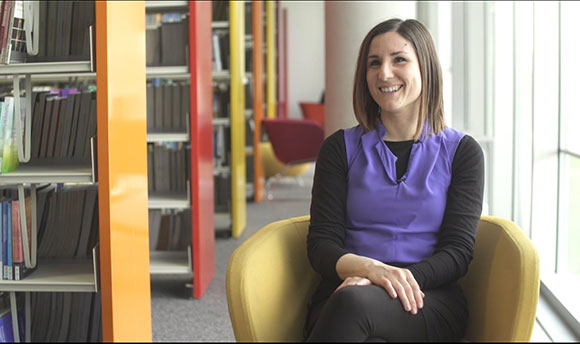- This course is still available for entry in September 2025.
- International applications close for the September intake on the 30 June 2025 for all applicants who would require to be sponsored on a Student visa to study here.
Digital Campaigning and Content Creation - MSc
Are you a blogger, a creative individual, a current communications professional, or a recent graduate looking to move into the field of digital campaigning and content creation? This forward-looking Digital Marketing Institute (DMI)-accredited MSc in Digital Campaigning and Content Creation will equip you with the in-demand skills and knowledge to produce digital content that will grab people's attention and make a difference.
So, how can you stand out in a digital world where a million minutes of video are shared every second? How do you create content that can’t be ignored and find your own visual voice? This course will give you practical understanding of content creation and campaigning, and deep knowledge of digital strategic planning that will set you apart in the job market.
The course is available both full and part time and offers a placement opportunity.
Why QMU?
- Prepares you for current and future developments: The course is designed to meet not just current industry practice, but developments in the future. You’ll be well placed to produce strategic and creative content to compete in a world where video accounts for 80% of internet traffic.
- Passionate and award-winning staff: Our staff live and breathe their subject with a passion, and you will be taught by multi-award winning lecturers, including Walid Salhab whose short films have accumulated more than 8 million hits on social media and who has won 70+ international awards for his short films.
- Supportive, creative and nurturing learning environment: You will work in a personal and collegiate environment that nurtures creative talent, which will enable you to build your portfolio, and that supports entrepreneurial students to establish their own businesses. Watch the video content on this page for an insight into our students' experience of the course, and the links to student case studies.
- Flexible block-study: This means you can combine study with your existing work and life commitments.
- Placement/Industry experience opportunity: Choose to build on your skills and experience by working for a live client.
- Industry accreditation: This course is accredited by the Digital Marketing Institute (DMI). The DMI accreditation shows employers that your degree and learnt skills/knowledge are up to date with the latest findings in marketing and that you have received a high quality multi-disciplined degree (see 'DMI accreditation' tab for more information). QMU is also a partner institution of the Public Relations and Communications Association (PRCA).
A short film on the MSc Digital Campaigning and Content Creation course created by QMU BA (Hons) Film and Media graduate Anton Winters
First-rate digital content has one primary quality; it makes us pause and want to look, to hear the message, to discover what happens next. Can the creation of such compelling material be a happy blend of good fortune and good timing? No, there is a method, and it can be mastered using skills learned on this practically-focused course. By understanding the language of film you will learn how to improve content. Along with campaign strategy, you will learn engaging visual storytelling techniques (such as mise-en-scene, continuity and montage) that are essential for effective short documentaries, adverts or dramas. You will also learn key news-media production skills (such as interviewing, managing, producing, directing, shooting and editing short newsworthy film and other digital content).
This course has been inspired by the professional experiences of our academic staff and maximises our expertise in PR, film and media. Our media production lecturers have won a host of international awards for their short films and are highly successful on social media. Our PR and communications lecturers have professional and personal campaign experience and are involved with a range of campaigning organisations and have also won awards for their work. Our experience is at the centre of our teaching approach and we always engage students in producing real strategies and content for real clients. This results in campaigns where video and digital content have had a profound effect on audiences and have been crucial in achieving strategic aims and objectives.
Structure and exit awards
You can opt to study for the full MSc (180 credits), a PgDip (120 credits) or a PgCert (60 credits).
You can also register as an associate student to complete a single module for CPD. On completion of a single module, you may wish to complete further modules and progress your studies to a named award. Contact Ann Turner for more information on single module study.
Teaching, learning and assessment
Our teaching enables you to produce a portfolio of material suitable for satisfying existing or impressing future employers. You will work in groups during workshops to develop and test your knowledge and work on an individual basis to produce assessments that will include campaign strategies, case studies, a variety of short films and other content. You will work for an extended period, supervised by a QMU lecturer, to create strategic communication material for a client or organisation of your choice. You can also chose to undertake an industry placement or build a digital portfolio to enhance your professional aspirations. We are particularly proud of our strong links with organisations that agree to be placement hosts or live clients for our students.
Students on the MSc in Digital Campaigning and Content Creation will utilise our film and video editing suites, which includes a subscription to the Adobe Creative Cloud suite (that will be installed on your PC/Mac for the length of the course) and access to latest range of camera equipment like the Black Magic Ursa and the latest Sony cameras and Canon lenses.
Placement/industry-based learning
This is an ideal course for learning key theories and applying them to practice. You can choose to undertake 80 hours to integrate practice with theory, by working directly with clients and organisations. Students are responsible for securing their own placement host and related costs (eg travel and accommodation) but we will help you with CVs and provide networking opportunities with a range of organisations with whom we have strong relationships.
Teaching hours and attendance
We teach most of our modules in half-day blocks so that we can facilitate practical and group work as well as more formal lectures. We find that students enjoy this approach, and lecturers can be more creative and involved in the learning experience.
We timetable teaching of core modules on Thursdays and Fridays to support people who are working or with caring responsibilities. While some elective modules fit in alongside the core modules on these days, some do run on other days. Your specific timetable will depend on the electives you choose and whether you study full time or part time.
Each 20-credit core module will typically involve between 18 and 24 hours of classes spread across the semester. The taught semesters run from September to December and mid-January to mid-April. As it is an intensive course, we advise people working full time to study with us part time.
Class sizes
Class sizes will depend on modules chosen but will normally be between 10-30 students. Workshops will be restricted in size and you will work in small groups.
Teaching staff
You can read more about the teaching staff on this course at the bottom of this page. Please note that teaching staff is subject to change.
You will complete the following modules:
- Strategic Communication Campaign Planning (20 credits): On this module students develop a critical understanding of the role of strategic communication within wider contexts including business, organisations, agencies, campaign groups and NGOs. They take a critical perspective to ethics, social responsibility and social justice and explore how strategic communication can impact on society. Theory is applied to produce creative communication campaigns including a range of communication activities and digital tactics.
- Visual Storytelling for Media Campaigns (20 credits): The art of storytelling is as old as the human race itself and our earliest forms of communication were deeply visual in nature. Even today, that hasn’t changed. In fact, if anything, having a mastery of visual storytelling techniques has become more important than ever. The success of our campaigning, marketing, advertising, and much of our digital entertainment relies on a solid understanding of such skills. This module will facilitate critical understanding of narrative techniques and enable students to plan, manage and produce campaign films, appropriate for submission to an organisation, client or broadcaster. The assessment is an Individual production project (a short documentary or a number of adverts or a drama film related to a client’s campaign).
- Non-Fiction Film Production (20 credits): Students will explore and practice techniques of digital content production for a client / organisation using digital capture devices & editing software to produce finished projects. This module will focus on factual media content. Students investigate and report on hard news, soft news documentary as well as developing production material. Techniques of news gathering including interview techniques and reporting are covered. This includes all aspects of video production, as well as journalism, feature photography and dissemination via print and online media. Students will be introduced to most available digital formats and shown how to upload visual digital content to online channels and social media.
- Digital Communications (20 credits): The evolution, diffusion, and adoption of digital technologies have fundamentally altered the way we live, work, relate to one another, and conduct business. These technological and societal changes are having a far-reaching impact on the communications, public relations and marketing disciplines, presenting huge challenges as well as opportunities to the industry. This module provides a sound theoretical and practical knowledge of digital communications based on a critical understanding of current and emerging technologies, digital strategies and social media platforms. The module examines a number of topics including: digital strategy; social media; search engine optimisation; online community building and management; stakeholders analysis; issues management; web analytics and big data; content marketing; online customer journey; ethical and legal aspects of digital communications; and more.
- plus two 20-credit electives from across the division. You can choose from international marketing, leadership in an international context, public affairs, political communication, business and media modules or industry-based learning, fundraising, development and finance.
For an MSc you will also complete a Master’s Communication Project (60 credits).
Who are DMI?
DMI are an internationally recognized network of over 250,000 members working in every major city across the globe.
QMU has chosen to partner with DMI in delivering this course as DMI accreditation is recognized by a Global Industry Advisory Council containing international organizations in Europe, North America and Asia. The DMI accreditation shows employers that your degree and learnt skills/knowledge are up to date with the latest findings in marketing and that you have received a high quality multi-disciplined degree.
What does accreditation mean for me as a student on this course?
1. Membership
With DMI accreditation, all students on this course will be given a membership account with the DMI. Students can login to the DMI website at their leisure and can access a wealth of information to assist with their studies, keep up-to-date, discover what is happening in digital marketing today – all of which is sure to help with your future employability.
As a member, you will be able to:
- access to an extensive database of marketing research resources such as articles, videos, eBooks, toolkits, specialised courses and lessons;
- view a back library of podcasts as well as view new biweekly podcasts from industry experts, which will help you sharpen your views and mindset;
- view monthly webinars delivered by guest speakers including some of the leading experts in digital marketing;
- access a glossary of industry terms which will ensure you understand what is meant by the terminology, acronyms and phrases used every day in the digital marketing industry
- access the DMI job’s board which will help you easily find current vacancies in the industry.
2. Qualification
As a student on the MSc Digital Campaigning and Content Creation you will study the core module ‘Digital Communications’, which the DMI has specifically accredited. On completion of your degree, which requires that you successfully pass this module, you will obtain a CDMA (Certified Digital Marketing Associate) accreditation from the DMI.
Can you think of an industry sector that hasn’t had its communications practices affected by the boom in digital content? So with this master’s under your belt your career options are rich and broad. You will be well-prepared to work as a staff member or freelance content creator in international marketing, public relations, media production agencies or campaigning organisations including NGOs and charities. We also support entrepreneurial graduates to set up their own businesses. Since 2014 we have supported a range of graduate start up media production businesses through our Start up Studio. The MSc is also benchmarked against Chartered Institute of Public Relations career progression requirements.
Entry requirements
A UK honours degree or equivalent OR significant work experience.
International students: You will be required to provide evidence of English language competence at no less than IELTS 6.5 and no individual component score below 6.0.
Other information
Students are required to pay for any additional expenses that may occur whilst on placement (eg travel or accommodation).
Disability/health conditions
If you have a disability, long-term physical or mental health condition, or learning disability, it should not stand in the way of your studying at QMU. However, if you are not sure whether your disability might be a barrier in your studies or in relation to the professional standards, please contact the disability service who will be able to have a conversation with you about reasonable adjustments and supports available to you.
Applying for this course
For more information on applying, or to apply for this course, please follow the links in the 'Start your application' box at the top right of this page.
Application deadline
Home students: End of August for September 2025 start and December for January 2026 start.
International students: End of June for September 2025 start and end of November for January 2026 start.
Contact Ann Turner (Programme Leader) or Contact Admissions
QMU has a number of articulation agreements in place with partner colleges and universities in Canada.
Our articulation agreements allow students from particular Canadian institutions to join particular QMU course/s, including this one, often with 'advanced standing' based on their prior learning.
More information on articulation routes with Canadian institutions.
- The delivery of this course is subject to the terms and conditions set out in our 2025/26 Entry - Terms and Conditions (Postgraduate).
- The information on this page is correct at the time of posting (October 2024) but is subject to change. In the event that modules change, QMU will seek to use reasonable endeavours to ensure that there is no detrimental impact on students. Please keep an eye on this page for updates.
Yes to Digital Campaigning and Content Creation: a student-made film
Become your best you: study at QMU
Course Overview
Engage with the Team
Join us at one of our Postgraduate Open Events
Find out about online and in-person opportunities to meet with us to find out more about our postgraduate courses and study at QMU.
Postgraduate Open Events - More Info and Bookings












